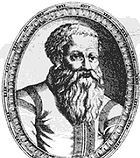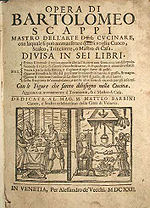
Bartolomeo Scappi
Encyclopedia


Renaissance
The Renaissance was a cultural movement that spanned roughly the 14th to the 17th century, beginning in Italy in the Late Middle Ages and later spreading to the rest of Europe. The term is also used more loosely to refer to the historical era, but since the changes of the Renaissance were not...
chef
Chef
A chef is a person who cooks professionally for other people. Although over time the term has come to describe any person who cooks for a living, traditionally it refers to a highly skilled professional who is proficient in all aspects of food preparation.-Etymology:The word "chef" is borrowed ...
. His origins had been the subject of speculation, but a recent research shows that he came from the town of Dumenza
Dumenza
Dumenza is a comune in the Province of Varese in the Italian region of Lombardy, located about northwest of Milan and about north of Varese, on the border with Switzerland....
in Lombardy
Lombardy
Lombardy is one of the 20 regions of Italy. The capital is Milan. One-sixth of Italy's population lives in Lombardy and about one fifth of Italy's GDP is produced in this region, making it the most populous and richest region in the country and one of the richest in the whole of Europe...
, according to the inscription on a stone plaque in the church of Luino
Luino
Luino is a small town and comune near the border with Switzerland on the eastern shore of Lake Maggiore, in the Province of Varese ....
. Prior to this, the first known fact in his life had been that in April 1536, he organized a banquet
Banquet
A banquet is a large meal or feast, complete with main courses and desserts. It usually serves a purpose such as a charitable gathering, a ceremony, or a celebration, and is often preceded or followed by speeches in honour of someone....
while he was in the service of Cardinal
Cardinal (Catholicism)
A cardinal is a senior ecclesiastical official, usually an ordained bishop, and ecclesiastical prince of the Catholic Church. They are collectively known as the College of Cardinals, which as a body elects a new pope. The duties of the cardinals include attending the meetings of the College and...
Lorenzo Campeggio. He served several other cardinals after this, then began to serve pope Pius IV, entering the service of the Vatican kitchen. He continued to work as a chef for the pope Pius V.
He acquired fame in 1570 when his monumental cookbook Opera dell'arte del cucinare was published. In the book he lists approximately 1000 recipes of the Renaissance cuisine
Cuisine
Cuisine is a characteristic style of cooking practices and traditions, often associated with a specific culture. Cuisines are often named after the geographic areas or regions that they originate from...
and describes cooking techniques and tools, giving the first known picture of a fork
Fork
As a piece of cutlery or kitchenware, a fork is a tool consisting of a handle with several narrow tines on one end. The fork, as an eating utensil, has been a feature primarily of the West, whereas in East Asia chopsticks have been more prevalent...
. He declared parmesan to be the best cheese on earth, and noted that "the liver of [a] domestic goose raised by the Jews is of extreme size and weighs [between] two and three pounds", indicating that Jews of the time were practicing the overfeeding needed to produce foie gras
Foie gras
Foie gras ; French for "fat liver") is a food product made of the liver of a duck or goose that has been specially fattened. This fattening is typically achieved through gavage corn, according to French law, though outside of France it is occasionally produced using natural feeding...
. Reprints of Opera were continually published from 1570 to 1643.
Scappi revolutionized the kitchen of his time through new preparation methods and the use of ingredients imported from America.
Scappi died on 13 April 1577 and was buried in the church of SS. Vincenzo and Anastasio alla Regola, dedicated to cooks and bakers.
The Opera dell'arte del cucinare was partially translated in Spanish (Libro de cozina, 1599, by Diego Granado Maldonado) and Dutch (Koocboec oft familieren keukenboec, 1612, by Antonius Magirus).
An English translation was done by the food historian, Terence Scully in 2008.

